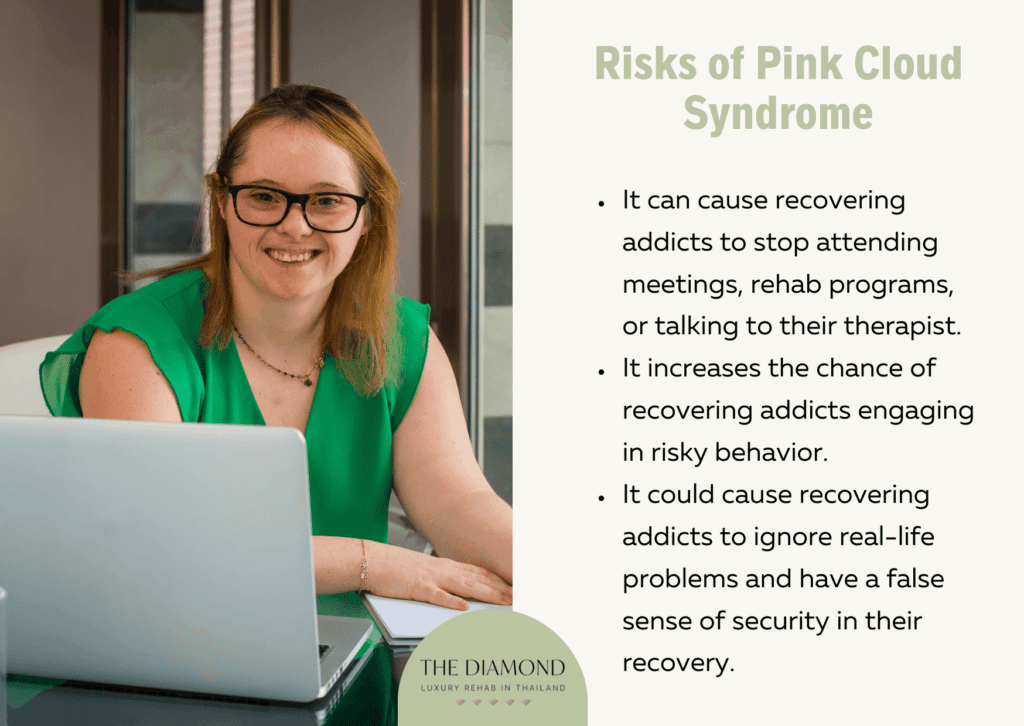Pink cloud syndrome: symptoms, causes, diagnosis, and ways to manage
Table of content
- What is pink cloud syndrome?
- What are the symptoms of pink cloud syndrome?
- What are the causes of pink cloud syndrome?
- How is pink cloud syndrome diagnosed?
- What are the benefits of pink cloud syndrome?
- What are the risks of pink cloud syndrome?
- What are the different ways for people to manage pink cloud?

Pink cloud syndrome, or pink clouding, is a phenomenon that occurs in the early stages of substance addiction recovery. It’s also known as the “honeymoon phase” of recovery – referring to a similar phase in romantic relationships.
Pink cloud syndrome can be recognized through its symptoms, including euphoria, overconfidence, unrealistic expectations, and denial. It is caused by the sudden increase of positive emotions after withdrawal from substance abuse.
There is no official diagnosis of pink cloud syndrome. It’s a phenomenon that occurs during the early stages of recovery. However, there are ways to manage the symptoms, including practicing mindfulness and setting realistic goals.
What is pink cloud syndrome?
Pink cloud syndrome, or pink clouding, refers to an early stage of addiction recovery marked by feelings of euphoria and overconfidence. This stage of recovery feels like a natural high, and the feeling is very similar to the high felt during active substance use, according to Addiction Group.
Pink cloud syndrome typically manifests once the withdrawal symptoms have decreased. At this stage, the individual in recovery experiences a significant improvement in their overall well-being, which triggers the onset of pink cloud syndrome.
Who is particularly prone to pink cloud syndrome?
People who are recovering from alcohol addiction are more prone to develop pink cloud syndrome. The term “pink cloud” was coined by Alcoholics Anonymous, according to Galinato et al. in their 2019 article published in the GSTF Journal of Nursing and Health Care (JNHC). However, pink cloud syndrome has been reported in the recovery of drug abusers as well.
What are the symptoms of pink cloud syndrome?

The symptoms of pink cloud syndrome are:
- Euphoria
- Overconfidence
- Unrealistic expectations
- Denial
- Lack of focus
- Difficulty accepting feedback
- Disinterest in support
1. Euphoria
Euphoria is a state of intense happiness and satisfaction. It is a powerful emotion and refers to moments of heightened feelings. Pink cloud syndrome evokes a euphoric sensation in individuals recovering from addiction, causing them to feel an overwhelming sense of happiness in relation to their recovery.
However, during this time, the person might be stuck with their head in the clouds and not pay much attention to their everyday lives, including their job and relationships. A recovering addict might also not pay much attention to their recovery process while under the pink cloud.
A common scenario of pink cloud euphoria occurs when recovering addicts experience an unusually intense sense of happiness regarding their recovery and look forward to each day with enthusiasm.
2. Overconfidence
Overconfidence refers to having more confidence than is supported by rational evidence. Individuals in recovery who experience pink cloud syndrome often feel overconfident about their abstaining abilities.
While feeling overconfident, individuals in recovery think they do not need rehabilitation or any recovery program since they feel so confident that they will not abuse drugs or alcohol again. According to Borst and Spann in their 2023 article published by Forbes Health, this is quite dangerous and could lead to insufficient rehabilitation and, eventually, relapse.
The overconfidence resulting from pink cloud syndrome can cause recovering addicts to overlook their triggers and fail to see risky situations, potentially leading to a higher risk of relapse.
3. Unrealistic expectations
Unrealistic expectations refer to having the wrong idea of how a situation or experience is going to pan out. Recovering addicts experiencing pink cloud syndrome usually have unrealistic expectations regarding their recovery.
Individuals in recovery might have the unrealistic expectation that recovery is easy and without any hardship. As soon as they reach an obstacle, it feels insurmountable since they did not expect it at all.
Pink cloud syndrome is not indefinite. At some stage in recovery, the pink cloud symptoms go away. However, recovering addicts with unrealistic expectations might anticipate feeling euphoric and overconfident throughout their entire treatment. When those feelings subside, it’s completely unexpected and could be the trigger for a relapse.
4. Denial
Being in denial refers to refusing to admit the reality of something unpleasant. For recovering addicts, being in denial means either refusing that they were ever abusing substances or refusing to admit that they need the help of a program to recover.
According to American Addiction Centers, individuals undergoing recovery who are in denial can often be challenging to collaborate with because they experience feelings of uncertainty and ambivalence.
Individuals in recovery who are experiencing pink cloud syndrome may be in denial about the seriousness of their substance abuse and the negative impact it had on their lives. This denial can directly influence their level of commitment to their rehabilitation process.
5. Lack of focus
Lack of focus or concentration refers to the inability to maintain attention on a specific individual or situation for more than a few minutes, often occurring without intended control or intention.
This mental fog can be distressing for individuals in the process of recovery from addiction, as it is an unpleasant sensation. However, according to Alcohol Rehab, it is a common occurrence in the early stages of substance abuse recovery.
When experiencing a lack of focus, recovering addicts may encounter challenges when trying to concentrate on their daily activities. This can affect their performance at school, work, or in any other setting that demands focus.
6. Difficulty accepting feedback
Many people have difficulty accepting feedback in any area of their lives as they see all feedback as a negative concept. Difficulty accepting feedback is not an uncommon occurrence. In fact, difficulty accepting criticism is a common characteristic of addicts and alcoholics, according to a 2021 article titled “Accepting Criticism” published by Addictions UK.
When individuals in recovery are experiencing the pink cloud syndrome, it may be even more difficult for them to accept feedback. This is possibly due to the denial they might feel regarding their addiction and recovery.
Recovering addicts may experience a sense of overconfidence, leading them to mistakenly believe that their recovery is flawless and that they don’t require any input or feedback from others.
7. Disinterest in support
Disinterest in support refers to a lack of desire for any support, advice, or help from friends and family during the recovery process. When individuals are recovering from addiction, there are several reasons why they may lose interest in seeking support. These reasons include fear and stigma associated with being a recovering addict, as well as not realizing the significance of support in the recovery process.
Recovering addicts who are feeling euphoric and overly confident may choose to pretend that they never had an addiction problem, as they perceive recovery to be a simple and effortless process. On the other hand, individuals in denial about their addiction might believe that seeking support only magnifies the significance of their past addiction, leading them to avoid it.
Pink cloud syndrome can lead recovering addicts to lose interest in the supportive words of their family members or even becoming offended when friends bring up their recovery in conversations.
What are the causes of pink cloud syndrome?
The sense of relief after withdrawal symptoms of addiction recovery subside typically causes pink cloud syndrome. However, everyone is different, and although pink clouding typically manifests in the early stages of recovery, it could appear at various stages in the recovery process.
A boost in self-confidence characterizes pink cloud syndrome which individuals experience after a period of abstinence. It can also arise from the relief felt after recovering from the physical discomfort, exhaustion, and sickness that accompany continued substance use.
How is pink cloud syndrome diagnosed?
Pink cloud syndrome is not diagnosed in the traditional sense of the word. As of yet, the syndrome has not been mentioned in the Diagnostic and Statistical Manual of Mental Disorders, and there are no diagnostic criteria.
If an addict who has recently started their recovery journey starts to feel euphoric, overconfident, or have unrealistic expectations, it’s said that they have pink cloud syndrome.
How long does pink cloud syndrome typically last?
Pink cloud syndrome can last for several days, weeks, or even months in certain instances. The duration of this phenomenon is not predetermined, as the process of drug and alcohol recovery varies for each individual.
For some individuals, pink clouding is not a one-time occurrence. They might feel the symptoms come and go throughout their recovery process.
Does addiction recovery involve pink cloud syndrome?
Yes, the addiction recovery process may involve pink cloud syndrome, often also referred to as the honeymoon phase of recovery. However, every individual has a unique recovery experience. There is no guarantee that every recovering addict will experience this phenomenon, even though many do.
Does the pink cloud condition present any specific obstacles for recovering alcoholics?
Yes, alcoholics in recovery who experience pink cloud syndrome are more likely to engage in risky behavior, according to Borst and Spann in their 2023 article published by Forbes Health. Those in alcoholic addiction recovery may have a higher chance of relapse since the pink cloud gives them a sense of overconfidence and leads them to believe that drinking has no consequences.
What are the benefits of pink cloud syndrome?

Pink cloud syndrome is a phenomenon that happens during addiction recovery. It’s when someone feels extremely happy and overly confident about their progress in recovery, and this usually occurs during the early stages of recovery. The benefits of pink cloud syndrome are listed below:
- It provides individuals with hope and energy to repair broken relationships.
- It promotes a shift towards a more positive perspective on life, which can greatly benefit most individuals in their recovery from addiction.
- It enables individuals in recovery to feel enthusiastic about their sobriety and the potential for a substance-free future.
What are the risks of pink cloud syndrome?

The risks of pink cloud syndrome are listed below:
- It can cause recovering addicts to stop attending meetings, rehab programs, or talking to their therapist.
- It increases the chance of recovering addicts engaging in risky behavior.
- It could cause recovering addicts to ignore real-life problems and have a false sense of security in their recovery.
Can pink cloud syndrome lead to relapse?
Yes, pink cloud syndrome can lead to a relapse. When individuals in recovery feel the euphoria and excessive confidence associated with this syndrome, they may mistakenly believe that their journey to recovery will be effortless. However, when they inevitably encounter challenges along the way, it can become overwhelming and increase the likelihood of a relapse.
What are the different ways for people to manage pink cloud?
Listed below are strategies to manage pink cloud:
- Acknowledge the pink cloud
- Practice mindfulness
- Set realistic goals
- Stay connected to a support network
- Focus on self-care
- Stay humble
1. Acknowledge the pink cloud
Acknowledging the pink cloud refers to recovering addicts being able to recognize and identify the symptoms of pink cloud syndrome within themselves. Understanding and acknowledging these symptoms is an important first step, as being able to acknowledge one’s own feelings and triggers is vital to being able to manage them.
When recovering addicts start to feel uncharacteristically happy, hopeful, or confident, they should consider the possibility of pink cloud syndrome and be able to distinguish between how this phenomenon is making them feel and how they really should feel.
2. Practice mindfulness
Mindfulness refers to calmly accepting one’s feelings and always feeling present and in the moment. Mindfulness activities that recovering addicts can practice include yoga, walking, and meditation.
Mindfulness helps individuals in recovery, who are experiencing pink cloud syndrome, manage their emotions and cravings. When recovering addicts feel euphoric, in denial, or overconfident, practicing mindfulness should help them manage those emotions.
3. Set realistic goals
Setting realistic goals in addiction recovery involves establishing achievable and practical objectives that are in line with the person’s specific circumstances and recovery process. This ensures that the goals are attainable and can be successfully pursued within a reasonable timeframe.
Setting realistic goals help to manage unrealistic expectations, a symptom of pink cloud syndrome. Setting realistic goals also helps recovering addicts achieve their goals and receive a sense of accomplishment.
It keeps individuals experiencing pink cloud syndrome focused on their recovery and not succumbing to their unrealistic expectations. When individuals in recovery set a recovery goal for themselves, they should be 100% sure that it is achievable and realistic.
4. Stay connected to a support network
The support network for recovering addicts consists of their friends, family, and the larger community. This network motivates individuals in recovery to stay connected to their recovery process through shared understanding and support, according to the Substance Abuse and Mental Health Services Administration.
Staying connected to a support network promotes accountability, which also encourages recoverees to stay on track with their program. When friends and family start to notice changes in recovering addicts’ attitudes and emotions, those concerns should be acknowledged, accepted, and investigated.
5. Focus on self-care
Self-care refers to taking care of one’s own mental, physical, and emotional well-being. People often neglect self-care when in active use. Thus, when in recovery, individuals should focus on rebuilding that relationship with themselves, according to a 2023 article titled “Why Is Self-Care Important in Recovery?” published in The Yale Ledger.
Self-care practices which recovering addicts can implement include getting enough sleep, improving diet and exercise routines, paying more attention to personal hygiene, and participating in hobbies.
6. Stay humble
Staying humble is a valuable trait that involves avoiding excessive pride or assertiveness. In the context of addiction recovery, humility plays a crucial role in maintaining a realistic perspective and preventing the development of pink cloud syndrome.
By embracing humility, individuals in recovery acknowledge their limitations and recognize the need for support and assistance. Maintaining a humble attitude allows individuals to recognize that they do not possess all the answers or solutions to their struggles.
How can recovering drug users get out of the pink cloud?

To get out of the pink cloud, the initial step involves acknowledging the presence of pink cloud syndrome and approaching each day with a mindful perspective while objectively assessing one’s emotions. If the symptoms begin to manifest and disrupt the drug abuse recovery process, drug users in recovery should communicate with their designated recovery specialist or therapist.
How can people who are recovering from sex addiction handle pink cloud syndrome?
People who are recovering from sex addiction should remain committed to their recovery program, no matter how confident the pink cloud might make them feel. One should be wholly engaged with everyday recovery activities and not lose focus on the bigger picture.

